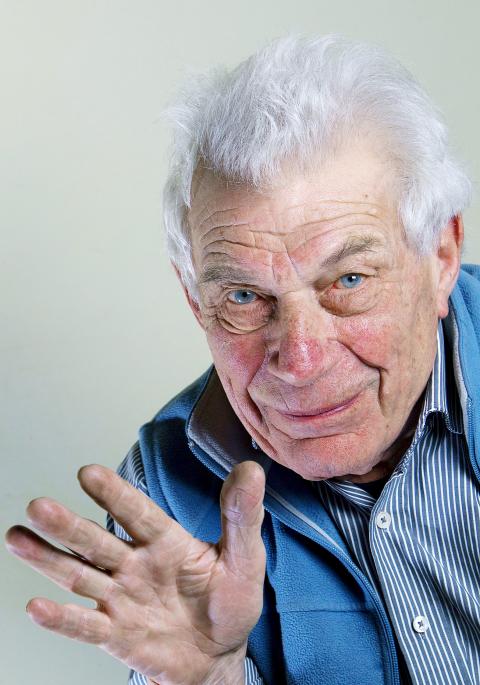Influential British art critic and prize-winning author John Berger, a self-declared revolutionary who controversially backed the far-left Black Panthers, has died aged 90, his son told AFP Tuesday.
Berger was best known for his art criticism essay Ways Of Seeing, written to accompany a BBC television series, which is credited with changing the way people viewed art.
He also won the 1972 Booker Prize for Fiction for his experimental novel G., set in pre-World War I Europe.

Photo: EPA
Berger died on Monday in the Paris suburb of Antony, his son Jacob said.
“He died peacefully at home, surrounded by his family,” he said. He had lived in France since the 1970s.
Berger was born in London in 1926. After serving in the British army, he enrolled in the Chelsea School of Art, becoming a painter.
He then taught drawing from 1948 to 1955, becoming a noted art critic from 1952 onwards, according to his French publishers, Les Editions de l’Olivier.
He wrote about artists including Pablo Picasso, Titian, Paul Cezanne and Gustave Courbet.
Ways of Seeing, a highly influential criticism of Western cultural aesthetics, originally aired in 1972 as a four-part BBC television series and was subsequently published as a book.
“Art and the wider world seemed to make more sense after watching Berger on the BBC, with his piercing blue eyes, steady delivery and groovy seventies shirt, eloquently explain perspective or the idealization of the nude,” wrote Mark Brown, arts correspondent for Britain’s Guardian newspaper.
BLACK PANTHER DONATION
But besides art criticism, Berger also wrote novels, plays and poetry.
G. won the Booker Prize, one of the most prestigious awards in English-language literature.
A Marxist humanist who called himself a revolutionary, he donated half of his prize money to the UK branch of the Black Panthers, the far-left black nationalist organization.
“There is not a single book of his that is not impregnated with politics,” Jacob Berger said.
“He was a friend of Subcomandante Marcos (former leader of Mexico’s Zapatista rebels), a friend of the Palestinian people... who had an extremely strong political position without being a dogmatic communist.”
Berger moved to France to escape the “extremely anti-communist” Britain, his son said.
In France, “there was a balance which tended much more towards support of, if not the Soviet Union, then of Marxist and communist ideals.”
‘A GREAT STORYTELLER’
Tributes came from the worlds of art, literature and politics.
“With John Berger’s passing we have lost one of the great storytellers of our times,” said publishers Penguin Books.
Jeremy Corbyn, the veteran leftist leader of Britain’s main opposition Labor Party, said: “John Berger changed the way we see the world and each other.
“He was an advocate for socialism — and a more kind and generous life for all.”

June 2 to June 8 Taiwan’s woodcutters believe that if they see even one speck of red in their cooked rice, no matter how small, an accident is going to happen. Peng Chin-tian (彭錦田) swears that this has proven to be true at every stop during his decades-long career in the logging industry. Along with mining, timber harvesting was once considered the most dangerous profession in Taiwan. Not only were mishaps common during all stages of processing, it was difficult to transport the injured to get medical treatment. Many died during the arduous journey. Peng recounts some of his accidents in

“Why does Taiwan identity decline?”a group of researchers lead by University of Nevada political scientist Austin Wang (王宏恩) asked in a recent paper. After all, it is not difficult to explain the rise in Taiwanese identity after the early 1990s. But no model predicted its decline during the 2016-2018 period, they say. After testing various alternative explanations, Wang et al argue that the fall-off in Taiwanese identity during that period is related to voter hedging based on the performance of the Democratic Progressive Party (DPP). Since the DPP is perceived as the guardian of Taiwan identity, when it performs well,

The Taiwan People’s Party (TPP) on May 18 held a rally in Taichung to mark the anniversary of President William Lai’s (賴清德) inauguration on May 20. The title of the rally could be loosely translated to “May 18 recall fraudulent goods” (518退貨ㄌㄨㄚˋ!). Unlike in English, where the terms are the same, “recall” (退貨) in this context refers to product recalls due to damaged, defective or fraudulent merchandise, not the political recalls (罷免) currently dominating the headlines. I attended the rally to determine if the impression was correct that the TPP under party Chairman Huang Kuo-Chang (黃國昌) had little of a

At Computex 2025, Nvidia CEO Jensen Huang (黃仁勳) urged the government to subsidize AI. “All schools in Taiwan must integrate AI into their curricula,” he declared. A few months earlier, he said, “If I were a student today, I’d immediately start using tools like ChatGPT, Gemini Pro and Grok to learn, write and accelerate my thinking.” Huang sees the AI-bullet train leaving the station. And as one of its drivers, he’s worried about youth not getting on board — bad for their careers, and bad for his workforce. As a semiconductor supply-chain powerhouse and AI hub wannabe, Taiwan is seeing